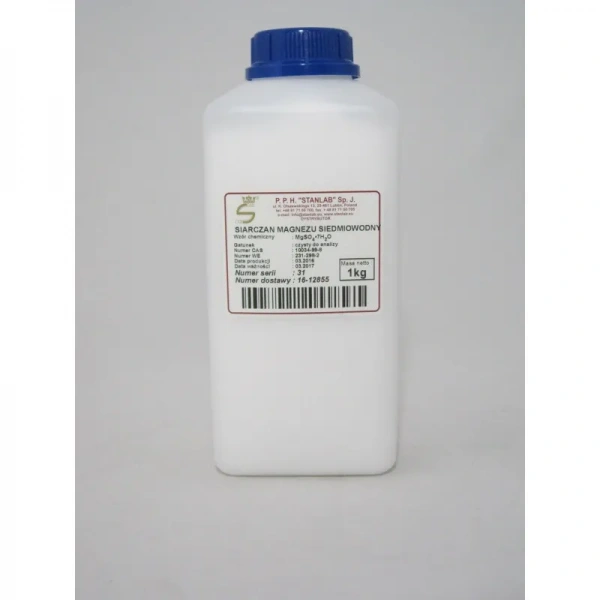- For the home
Health
- Bones and Joints
- Digestion and Healthy GI
- Essential Oils
- Fish Oil / Omega-3
- Healthy Sleep
- Heart and Cardiovascular System
- Immunity
- Liver
- MCT Oil
- Men
- Mind and Focus
- Minerals
- Pet Supplements
- Pro-Health Supplements
- Probiotics
- Senior
- Superfoods
- Urinary Tract
- Vitamins
- Vitamins for hair
- Vitamins for nails
- Vitamins for the skin
- Weight Management
- Woman
Healthy Diet
Herbs
Mother and Baby
Sport
Your Goal
Pet Supplements
Cosmetics
- Cosmetics for children
- Men's Cosmetics
- Unisex Cosmetics
- Women's Cosmetics
- Dezodoranty i perfumy
- Higiena jamy ustnej
- Kosmetyki akcesoria
- Kosmetyki dla dzieci2
- Kosmetyki do ciała
- Kosmetyki do higieny intymnej
- Kosmetyki do opalania
- Kosmetyki do pielęgnacji ust
- Kosmetyki do twarzy
- Kosmetyki do włosów
- Papier toaletowy / chusteczki
STANLAB Epsom salt CHCZ (Magnesium sulfate) 1kg
Available: 0 pcs.
3,67 €
Temporarily unavailable
After purchase you will receive 15 pts
Product Details
- Description
- Dosage
- Ingredients Table
- About the brand
- Nutritional information
- Reviews (3)
- Articles
Bitter salt has health-promoting properties. The beneficial effect on the mental sphere is described many times, it consists in putting you in a good mood by alleviating the symptoms of stress, anxiety or depression. Epsom salt bath, thanks to the supply of large amounts of magnesium compounds, can generate increased serotonin production in the brain, which promotes relaxation. Additionally, magnesium helps to alleviate the symptoms of inflammation in the tissues.
Magnesium salt also causes the relaxation of excessively tense tissues, which is especially desirable in the case of musculoskeletal ailments. Due to the sulfur content, such a procedure can be helpful in the reconstruction of articular cartilage.
Epsom salt - the action of bitter salt
The effect of magnesium sulfate, as you can see, can have a very wide spectrum. The use of Epsom salt is not limited to just one specific medical condition. It can be used to support the treatment of rheumatic diseases (e.g. fibromyalgia), inflammations and acne problems.
Its beneficial properties in reducing the inflammatory reaction of internal organs, lowering the risk of cardiovascular diseases and improving the digestive process of food and regulating the rhythm of bowel movements are very often described. Some experts emphasize the positive effects of bitter salt on parasites (Epsom salt taken by mouth).
Epsom salt for bone and joint pain
Salt bath, through its relaxing effect, helps to get rid of many ailments related to pathological, increased muscle tension. Adding Epsom salt to your bath helps to relieve pain in your arm, neck, back, and legs. Lowering the tonus of the muscle tissue around the head may result in relieving headaches and supporting the treatment of migraines. Due to the content of sulfur compounds, a very positive effect on rheumatic diseases is observed. Epsom salt can therefore be used for joints, headache, knee pain, muscle pain or rheumatic pain.
Epsom salt for puffiness
Sulfur salt also has soothing properties. This has its application in reducing swelling, bruises and bruises. The most effective are then baths with its use or topical compresses in the form of sterile compresses soaked in an Epsom salt solution. The soothing properties of magnesium sulfate are also used in patients with the feeling of heavy legs. They perfectly alleviate such ailments, which are often the result of working in a standing position.
Epsom salt in cosmetics
The use of bitter salt in cosmetics can have a very wide spectrum. The sulfur contained in it soothes the symptoms of acne skin. It also promotes the condition of hair and nails. By adding it to cosmetics, you can expect proper care for oily skin, because Epsom salt regulates sebum secretion and reduces oily hair. It is worth remembering that adding magnesium salt to the bath makes it easier to cleanse the scalp and get rid of excess products used for styling hairstyles.
What is the benefit of soaking your feet in water with salt? Well, such a brine bath softens the skin, which makes it easier to get rid of cosmetic defects in the form of calluses, corns or cracked skin on the heels.
- Substance name: MAGNESIUM SULPHATE SEEDOHYDRATE
- Chemical formula: MgSO4 • 7H2O
- Physical and chemical properties
- Form: solid
- White color
- Odor: odorless
- pH: 5.5 - 6.5 (50 g / l H2O; 20 ° C)
- Melting point: decomposition> 150 ° C
- Boiling point: no data available
- Auto-ignition temperature: not applicable
- Flash point: not applicable
- Explosion limits: not applicable
- Steam pressure: no data available
- Density: 1.68 g / cm3 (20 ° C)
- Bulk density: approx. 900 kg / m3
- Solubility: in water: 710 g / l (20 ° C) in organic solvents: no data
Dosage
Form: Powder
Other ingredients
Cannot be used as a substitute of a healthy and balanced diet.
Consult your physician if you are pregnant or nursing.
Do not exceed recommended dosage per day.
Keep out of reach of children.
Best before: date on the package
All descriptions are the property of the www.mass-zone.eu. Copying or distribution is strictly prohibited! As per the Copyright Act from February 4th, 1994.
Manufacturer: Przedsiębiorstwo Przemysłowo- Handlowe „STANLAB” SP. Z O.O.
Inna forma dostarczania magnezu. Czemu nie. Uzywam do kąpieli.
Wysokiej jakości sól do do kąpieli . Polecam
Great for your body when taking 1 tea spoon in 1 Liter of water and drink every day. I have been taking it for may years, bever been to a doctor bo need.
We make every effort to ensure that reviews come from customers who have used or purchased the product. Reviews are collected, verified, and published according to the rules described in the store's terms and conditions.

























